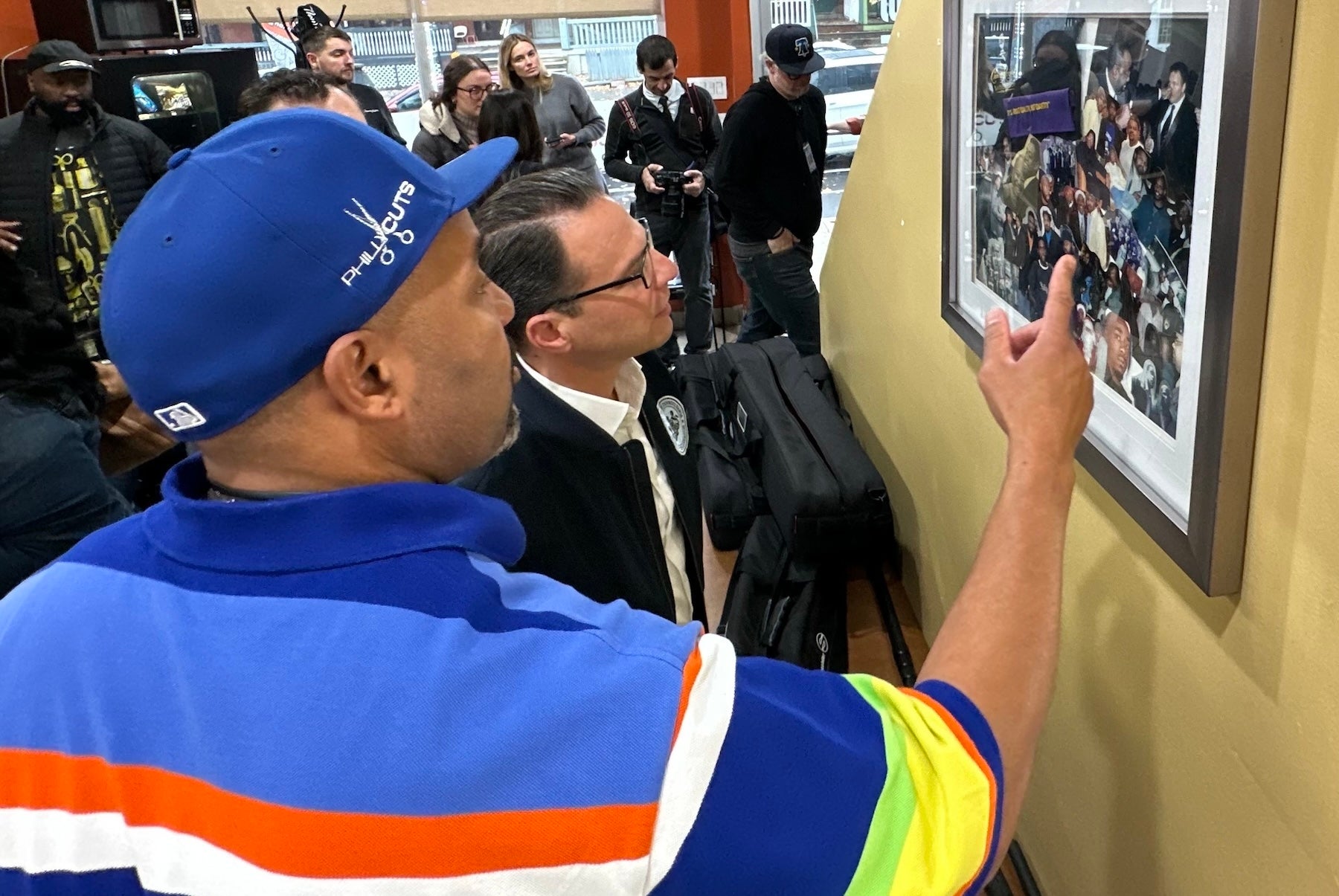Bussiness
Here’s what Pa Gov. learned from small businesses at a West Philly barbershop

Have a question about Philly’s neighborhoods or the systems that shape them? PlanPhilly reporters want to hear from you! Ask us a question or send us a story idea you think we should cover.
The vibe inside a West Philly barbershop was decidedly casual, as Pennsylvania Gov. Josh Shapiro donned sneakers, a bomber jacket, a white shirt and no tie.
Shapiro then settled into a barber’s chair, engaging in an open conversation with small business owners Darryl Thomas, Zina Johnson Patrick and Ann Turner, all leaders of the Pennsylvania Professional Image Alliance.
Before the public discussion, Shapiro spent time with a select group of barbers on the second floor of shop Philly Cuts — all of whom are small business owners in their own right because they rent chairs and bring their own clients to the shared space.
Three key topics emerged during the public discussion with hair industry leaders: state level deregulation with extra support ideas for small businesses, what Shapiro can do to save SEPTA from decline and ways the governor can shield vulnerable residents from policies enacted during the upcoming Donald Trump presidency.
On SEPTA, Shapiro had little to share in response on Thursday other than he was instrumental in helping avert a workers’ strike. He promised more information soon.
A press conference at the Frankford Transportation Center in Philadelphia is expected Friday morning.
Shapiro said his administration took part in negotiations with the Transit Workers Union Local 234 — SEPTA’s largest union, representing the bus drivers, trolley and subway operators who threatened to strike for weeks.
“I won’t let SEPTA fail,” Shapiro told WHYY News.
Beyond that, the governor previously served as the state’s attorney general under the first Trump term and promised to protect civil rights on Thursday. He said he wouldn’t hesitate to file lawsuits against the federal government if it steps out of bounds.
And when small business owners told him about a fellow shop owner who could be dealing with a potentially unscrupulous insurance company, Shapiro didn’t hesitate to offer the full support of consumer protection through the state’s insurance regulator.
Head barber Thomas owns Philly Cuts, which he says is the center of his community and has been since the mid-1990s.
“This is the Black man’s country club,” Thomas said. “Any issues that are going on, they’re discussed. And most times in here we develop a plan of action and we go at it.”
So when Shapiro sat down to talk shop, sports and public policy, the barbers leaned in.
Shapiro’s administration already trimmed the time needed to become a licensed barber, from two weeks to same-day approvals.
“One of the ways you create more opportunities is you break down all the silos that exist in government. You cut through the red tape and you get people to work more quickly,” Shapiro touted.
But Thomas is on edge about the future because his community relies on social safety nets, and there are many mixed immigration status families such as Jamaicans and Haitians in Philadelphia.
“I’m a little nervous. That was one of the things I spoke to the governor about,” he said. “You have people that need SNAP benefits, that need affordable healthcare, [who] are going to be affected if [Trump] holds true to the promises prior to getting elected.”
The shop in the 4400 block of Chestnut Street showcased portraits of prominent historical figures, including boxers Muhammad Ali and Joe Frazier, and political activists Malcolm X and Martin Luther King Jr. More recent political figures included a poster of former president Barack Obama.
Obama did not visit Philly Cuts; instead he stopped by a barber shop on 52nd Street while campaigning in Philadelphia.
But this year, Vice President Kamala Harris, the Democratic nominee for president, recently visited Thomas and his barbers.
When asked about the economy, Thomas said some voters this Election Day didn’t look back far enough in history.
“If you voted for an economy, you would know that the economy that Trump received was because of Obama. What we’re going through is a residual of when Trump was president [during his first term],” he said. “And we get to look at how this economy is really going to pan out. One thing is for certain. Philly Cuts [will be] in the trenches doing what we need to do to stop the immediate bleeding [from Trump’s federal policy trickledown] and the governor already said he’ll do what he needs to do to protect Pennsylvania’s people. But it’s time to buckle up.”









